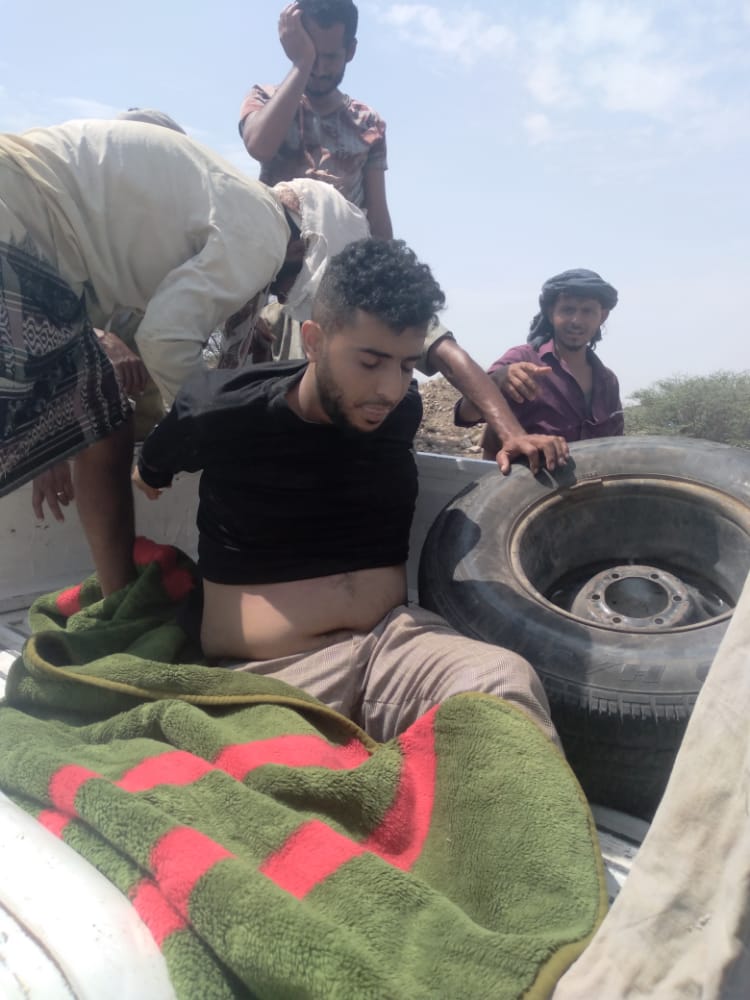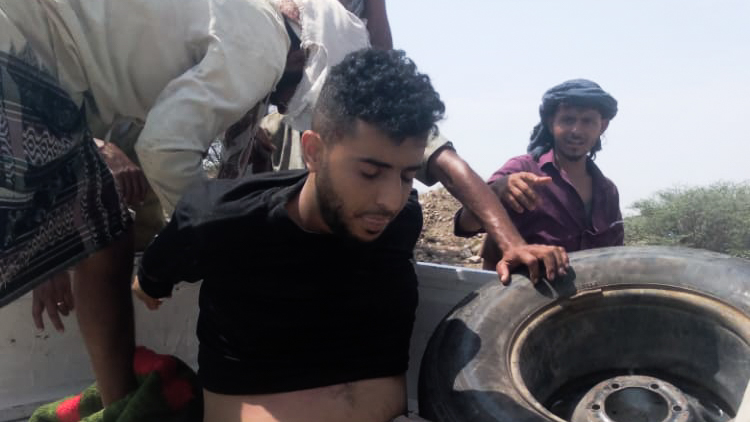DHAMAR, YEMEN –– As his hope that the Sana’a International Airport will be reopened has faded, smiley-faced Abdulmalek Anwar Alsanabani — a 25-year-old Yemeni-American living in Fresno, California — finally decided to take the risky journey across the south of Yemen in order to see his family in Sana’a. Al-Sanabani had gone eight years away from his loved ones. On Wednesday, he arrived at southern Yemen’s Aden Airport, where he shared his last Facebook post before his smiley face became bloodied and bruised.
Abdulmalek, a graduate of Huntsville Community College, was not kidnapped, imprisoned, and tortured like the thousands of Yemeni students traveling through Saudi-controlled points of entry have been. Rather he was robbed, tortured and murdered at a checkpoint in the Tour Al-Baha district in the northern Lahj province by the Security Belt Forces of Transitional Council, an armed militant group backed by the United Arab Emirates.
On Wednesday, the Southern Transitional Council (STC) announced they had arrested “a suspected member of the Houthi rebel movement” while he was traveling with thousands of U.S. dollars from Aden towards Houthi-controlled areas in the north. The news, published on websites supporting the UAE, was accompanied by a photo showing Alsanabani with his hands tied behind his back on the bed of a military vehicle.

Abdulmalek’s father recounted to MintPress that “We were in constant contact with Abdulmalek during his trip before communication was cut on Wednesday afternoon.” Later, his family was surprised when media outlets and statements by officials affiliated with the Saudi-led Coalition in Tor Al-Baha began reporting the arrest of their son on charges of belonging to the Houthis and possessing sums of money. “We quickly traveled to Aden, but were shocked to find his dead body in the morgue of the Republican Hospital in Aden after he had been tortured and killed,” his father said. Abdulmalek’s body was full of bruises and wounds indicating that he had been tortured. There were also three bullet entry wounds in his back and a fourth in his leg, according to the Alsanabani family.
Death for no reason
Abdulmalek, who had never so much as belonged to a political party or group, was looted of what he had saved for his family, tortured and killed by gunshots by soldiers wearing the uniform of, and receiving their salary from, Abu Dhabi. He committed no crime other than being from an area classified by the Coalition as a “Houthi area.” But Abdulmalek was not the only one to meet such a fate because of the region from which he hailed, his sect or his family.
On Saturday, four students — Hossam Tariq al Shaibani, Ibrahim Ahmed al-Shahari, Ahmed Moeen al-Madani, and Yahya Mansour al-Areiqi — were kidnapped when they arrived at Aden Airport. Their families told MintPress that their fate is still unknown, a fact confirmed by the General Union of Yemeni Students in Malaysia, which issued a statement in the wake of the disappearance.
Since 2015 — when the Saudi war, supported by the United States and other Western military powers, transformed this nation on the Arabian Peninsula into a large prison for millions of Yemenis — students studying abroad, along with stranded medical patients and expatriates, have had only this option to return home: either cross al-Mahrah, Syoun in the east or Aden in the south, all routes that pass through Lahj, Shabwah and Marib, areas under Saudi-led Coalition control. As soon as they arrive at these places, militants affiliated with Saudi Arabia or the UAE check their identities. If they live in provinces, cities, streets, or even neighborhoods that are classified as a hotbed for Ansar Allah (Houthis), or if they belong to certain Yemeni families or are affiliated with a Shia Muslim sect, they are often arrested, tortured and imprisoned on charges of belonging to the Houthis.
Grieving and protests
The plights of Abdulmalek and the four other students have touched the hearts of Yemenis across the political and religious divide and sparked an uproar inside the country and abroad. In the United States, hundreds of Yemeni expatriates took to the streets in Michigan, California and New York. Protesters condemned the crime and held the UAE responsible, calling for the Sana’a International Airport to be reopened so that Yemenis can travel safely without the risk of imprisonment, torture and death.
In Yemen, dozens of protests were held, mostly in the northern provinces, but the largest demonstration was in Abdulmalek’s hometown of Dhamar, a city in southwestern Yemen. There, many of his relatives who spoke to MintPress accused both the Biden administration and the UAE of murdering a family member and U.S. citizen. “If the Sana’a Airport was open, Abdulmalek would now live in peace. We know in fact that the airport siege is supported by America,” Hani Alsanabani, one of Abdulmalek’s relatives, told MintPress in the wake of a protest that took place in Sanaban. Abdulmalek’s death has also triggered condemnation from nearly all Yemeni political parties, human rights organizations, activists, journalists, lawyers, and members of the Yemeni community in the United States.
Forced to sell an organ for rent
The closure of the Sana’a Airport and the imposition of an air embargo have exacerbated the humanitarian situation for many civilians both inside and outside the country. With the continued absence of safe corridors, many stranded students, patients and professionals recently deported from Saudi Arabia are left in a state of legal limbo, unable to secure citizenship in neighboring countries and therefore unable to work — leaving them with no way to earn money short of begging on the street or agreeing to sell their organs.
In 2018, Musa al-Ezaki, the editor of Yemen’s widely-circulated Al-Hayat newspaper, made a very public offer to sell one of his kidneys to the highest bidder. Al-Ezaki coordinated with his brother who was living in Egypt at the time to place an ad in a Cario newspaper with the caption, “Under compelling circumstances, I regret to announce the sale of my kidney to pay rent; if someone wants to buy a kidney, please call me.” It’s unknown if al-Ezaki ever found a buyer.
A Saudi Move to Deport Yemeni Professionals En Masse is Likely to Backfire Dramatically
Since 2015, the Saudi bombing of civilians and infrastructure and the imprisonment and torture of political opponents have often characterized the news from Yemen. But the imprisonment of students in secret prisons supervised and managed by both the United Arab Emirates and Saudi Arabia — a fact that is well-known and likely supported by the United States — may be the darkest chapter in this dirty war.
The deaths of Abdulmalek and other students have again sparked concerns among millions of Yemenis — particularly expatriates, students, and medical patients stranded abroad — about the unchecked violence carried out by the Saudi-led Coalition in their country. The incidents further highlight the dangers faced by Yemenis seeking to travel across the country in dangerous circumstances, and the role of the United States in the ongoing suffering of Yemenis who struggle against starvation, epidemics and bombing. It is estimated that nearly four million Yemenis are currently stranded abroad, according to data provided by the Sana’a International Airport Media Center.
Feature photo | A photo showing Abdulmalek bound in the back of a truck belonging to UAE-backed militants
Ahmed AbdulKareem is a Yemeni journalist based in Sana’a. He covers the war in Yemen for MintPress News as well as local Yemeni media.


